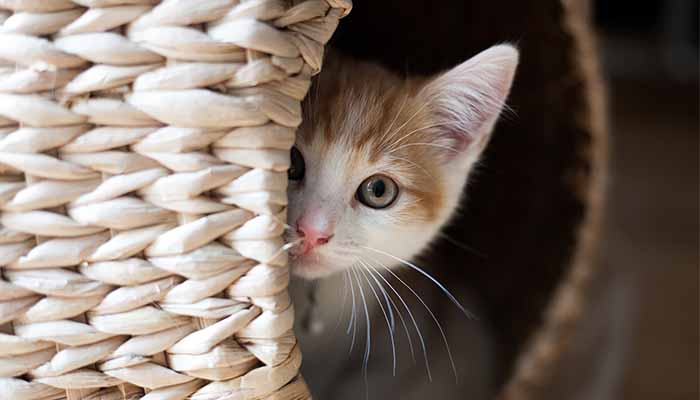Vomiting in cats
Vomiting in cats is a topic that comes up regularly in pet forums and vet discussions. This is a common problem...
Read more23 May 2022
Adopting a kitten is an amazing, rewarding experience. To watch a little curious cat develop its personality and learn about the world is truly a joy. As a new owner there may be some things you have not considered. Here’s some quick tips.
Much like expectant human parents it is vital that you ‘babyproof’ the space that your kitten will be living in. Cats are naturally curious, Kittens even more so because they are still learning about the world around them and testing their boundaries.
One tip would be to choose a single room of your house for your kitten to be housed in rather than allowing them full access, a bathroom or laundry could be a good consideration as tiles are more resistant to toileting accidents, or litter kicked all over the room, or food bowls knocked over.
Inspect the room you select, think kitten sized, and methodically remove or secure anything your new kitten could get stuck in, or hurt themselves with, or any escape routes as cats are born escape-artists.
If you limit the space your kitten has access to while still young, you ensure that your kitten is safe and won’t get injured. It also gives your kitten a place that he or she feels comfortable in as their territory. As a predator/prey creature cats like to know the space they are in intimately before they can truly relax and feel secure to settle.
If you go the bathroom or laundry route, the tiles are easy to clean but not good to sleep on. Make a soft bed, you could use a shoe box or something of similar size. Line it with something soft with your scent on it like an old jumper. Your scent will be comforting to your kitten and help you to bond. If you have a small ticking clock you can wrap this in the jumper as this will mimic a heartbeat, again this will be a comfort to the kitten. (There are also now products on the market like soft toys with simulated heartbeats available)

The old adage is that ‘You can’t teach an old dog new tricks’ this (somewhat debatable) statement also applies to cats, in that the most effective time to teach your kitten what behaviour is acceptable is while they are still young.
Cats have unique personalities, of course; however, while it is amusing for a kitten to try to scratch or bite you with its tiny, ineffective claws and teeth, a full-grown cat will definitely cause damage to you! You should stop playing with your kitten if it becomes overstimulated and gets ‘bitey’ or ‘scratchy’. Let it calm down and reset. You can teach your kitten not to bite or scratch you by moving away from them or, in worst case scenarios, leaving the room for a while.
Of course, reward positive behaviours with treats (but not too many).
Patting your kitten and giving them cuddles is naturally part of showing them love and affection, but it is also important to pat their paws, and tail and get them used to trusting your touch. Some adult cats can lash out if their paws or tails are touched, so preparing them from an early age to accept being handled is important. This also has the benefit of making them more accepting of the vet should they ever require treatment, if they come to understand that being handled is safe and not scary or harmful.
The single-room method is also helpful if you have other pets, particularly other cats as this will allow them to slowly acclimatise to each other, they will both be curious of each other, but if they can smell each other through the door, it should decrease hostility and allow them to get used to each other. Later, when your kitten is a bit bigger, supervised limited time visits can be done first. It is important that each pet feels comfortable and in their own space, before moving on to sharing a space.
Particularly if you have young children, remember that kittens need about 16 hours of sleep, when little they will crash abruptly (and amusingly) and be off to sleep. It is important to let them sleep as much as they need.
Give your kitten the best start in life by ensuring they are covered for accidents, illnesses, and more with kitten insurance. Pet insurance means your kitten can receive the best possible care when they need it most. Start your journey together with the security of knowing you’re prepared for any situation!